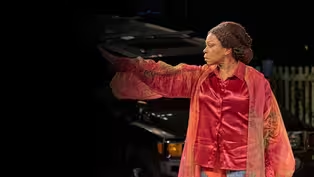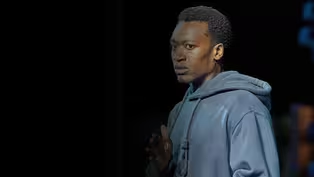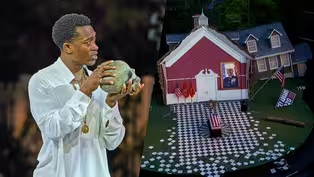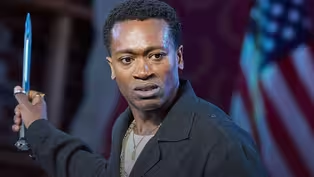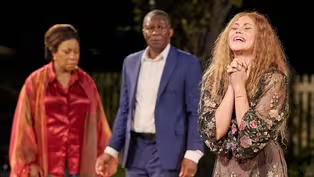
Hamlet and His Relationships
Clip: Season 51 Episode 19 | 14m 9sVideo has Closed Captions
The cast of Hamlet discuss what shapes their characters' interactions with one another.
The cast of Hamlet (Ato Blankson-Wood, Solea Pfieffer, and Nick Rehberger) discuss what forces influence their relationships with one another, and how a modern context helps bring new ideas within the play to life.
Problems playing video? | Closed Captioning Feedback
Problems playing video? | Closed Captioning Feedback
Major series funding for GREAT PERFORMANCES is provided by The Joseph & Robert Cornell Memorial Foundation, the Anna-Maria and Stephen Kellen Arts Fund, the LuEsther T. Mertz Charitable Trust, Sue...

Hamlet and His Relationships
Clip: Season 51 Episode 19 | 14m 9sVideo has Closed Captions
The cast of Hamlet (Ato Blankson-Wood, Solea Pfieffer, and Nick Rehberger) discuss what forces influence their relationships with one another, and how a modern context helps bring new ideas within the play to life.
Problems playing video? | Closed Captioning Feedback
How to Watch Great Performances
Great Performances is available to stream on pbs.org and the free PBS App, available on iPhone, Apple TV, Android TV, Android smartphones, Amazon Fire TV, Amazon Fire Tablet, Roku, Samsung Smart TV, and Vizio.
Buy Now
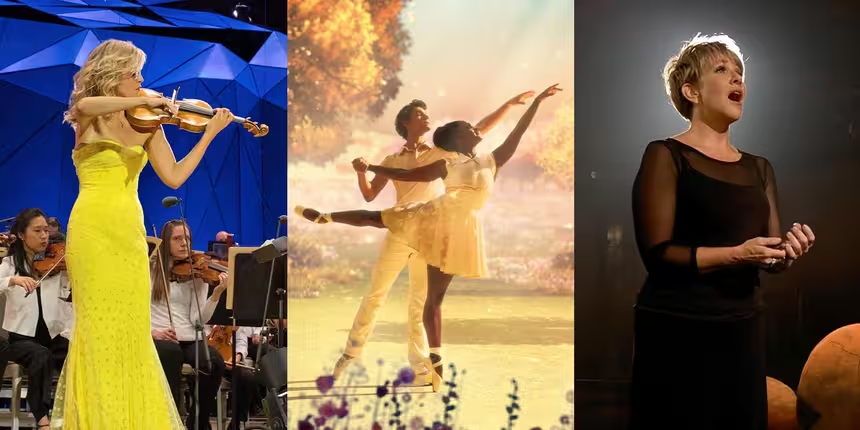
Great Performances Newsletter
Subscribe to the Great Performances newsletter to keep up with the latest full episodes to stream, exclusive content, and more!Providing Support for PBS.org
Learn Moreabout PBS online sponsorshipAlas, poor Yorick.
Can you speak a little bit about how you built your relationship with Solea and Ophelia and Lorraine and Gertrude?
Yeah.
I mean, the thing about Ophelia, I feel, and this probably is due in large part to Soleas portrayal, is that she and Hamlet are equals.
She's the closest -- maybe the closest thing that he has to like an intellectual equal.
They spar.
There's like, a real fire in their interaction.
And I think that that that is part of the passion that feeds their love.
You know, so I think in building my relationship with Solea and Ophelia, I felt like there was a real I owed a sort of just I didn't need to hold back.
That holding back would do a disservice to the character that Solea was trying to portray.
- Right.
That, like, I didn't need to handle her delicately.
And Lorraine, I mean, you have to come up to meet Lorraine, like, so there was a real something that was very important, I felt, to Lorraine was, was, was making sure that Gertrude was a powerful woman, you know?
- Mm hmm.
And as we especially in the closet scene, as we sort of moved through that.
She let me know that she she was not in any way going to take any of Hamlet's B.S.
You know, that there was very much about her as a black mother.
And there's a specific.
There's a specific way black Moms roll.
Absolutely.
So she brought a lot of that.
- How now Hamlet!
What's the matter now?
Have you forgot me?
No, not so.
You are the queen, your husband's brother's wife.
And would it were not so, you are my mother.
Nay.
Then I will set those to you that can speak.
I also found it so beautiful how protective she was of Hamlet.
Mm hmm.
Mm hmm.
- You know.
Yeah, I remember, like, in that last performance, we just.
We found this real.
The push and pull between who is the parent in what moment.
Or who is a caregiver in each moment.
They've both experienced a tremendous loss.
And I think often in those moments, who has the right to the grief in the moment?
Is a push and pull.
- Thats interesting.
Right.
And I think there was something about that particular scene where that both of their grief was like so on display that they had to be there for each other in various moments.
Yeah.
Yeah.
That little that little intricate moment at the top of the show when she pleads... Mm hmm.
- to you.
Stay, stay, stay here.
And, yeah.
And I do think...
I think she was the only, she's the only person who could have gotten him to stay.
I think she would have been a terror if she had not sort of, like, stepped in and said, Please stay.
I think he would have thrown a tantrum until he was allowed to leave.
Absolutely.
But there's something about that mother son connection that he valued.
Let not thy Mother, lose her prayers, Hamlet.
I pray thee.
Stay with us.
I shall, in all my best, obey you.
So the two boys in the show, Laertes and Hamlet, they both find themselves in this moment of grieving their fathers.
Yes.
Yes.
Yeah.
And it's also interesting that they were raised in the same house.
- Mm hmm.
And I find that really, like, my sister and I deal with grief completely differently.
Same.
Yeah.
Right.
But these two boys are quick to fire.
Yeah.
Can you talk about that?
Yeah, I think that that's that's really interesting, because I think we've actually found in this production a lot more similarities between Laertes and Hamlet than maybe is normal, because I've always read, you know, there is the foil of Hamlet, their exact opposites.
Hamlet has no idea what to do, and Laertes is strong in his resolve.
And I think there's some truth to that.
But in this version, our Hamlet is not really just floundering.
He's actually incredibly intelligent and he is kind of trying to figure out what to do.
In this version, I have sort of played Laertes as though he's, like I said before, getting on this moving train and that this this sequence of events just kind of happen to him.
Yeah.
Because of his own actions, but also because of the actions of the people around him.
And by the time he gets to the end and is staring Hamlet in the face and about to kill him, he realizes, How did I get myself in this position?
So I think there's I think there's a lot of... And there's the line in the play where Hamlet says, I see myself.
I forget the exact line, but in the portraiture of him.
And I think that, yeah, there's a lot of there's a lot of similarity there in that they're they've both been thrust into these very challenging emotional situations and are kind of scrambling to to get a footing.
And there's these adults, this older generation who are managing them, you know, and manipulating them a bit.
I dare damnation.
To this point, I stand at both the worlds I give due negligence.
Let come what comes.
Only I'll be revenged moat thoroughly for my father.
Good Laertes, if you desire to know the certainty of your dear father, is that writ in your revenge, that's swoop stake you will draw both friend and foe.
Winner and loser.
None but his enemies.
- Will you know them then?
To his good friends thus wide Ill open my arms and like the kind life rendering pelican repast them with my blood.
Why now you speak like a good child and a true gentleman that I am guiltless of your father's death.
And I most sensibly in grief for it.
Something I thought about toward the end of our run, um, was like the toll that it must take also to, um, enact vengeance on someone who is also a member of your family.
Mm hmm.
You know, um, I thought a lot about generational trauma.
Mm hmm.
And about specific to our production, about the relationships between, uh, black fathers and black sons, black uncles and nephews.
All of, like, just the sort of... And especially in this moment.
I was talking about this last night with some friends, just there is this feel that existing as specifically as a black man, that journey, that experience has evolved so much in the last decade that if you go back just one generation, it widens the chasm between that generation and this generation, you know?
So I think I think there's -- it just added another layer to the tensions that are already there that Shakespeare has set down.
Right?
That that Claudius has popped in between Hamlet's hopes to become king.
He's also married his mother like that in and of itself is one thing.
And then you layer also this sort of generational chasm that I think this contemporary production layered on.
And I just think that these men are at odds.
And I think later on in our run, I started to think about like, Where was the love here?
- Hmm.
You know, um, and I'm sure just as a kid, Hamlet probably loved his Uncle Claudius.
You know, there had to have been a connection there, otherwise he wouldn't be so hurt.
Therefore.
Our sometime sister now our queen.
Th imperial jointress to this warlike state, Have we —as twere with a defeated joy with an auspicious and a dropping eye, with mirth in funeral and with dirge in marriage, in equal scale, weighing delight and dole.
Taken to wife.
So as the son of Polonius growing up in this house.
Mm hmm.
What was your relationship like with Hamlet?
It's interesting.
There's not a lot of information about that in the text.
So we took some liberties and made some things up.
And for my interpretation of the character, I decided that they grew up and that they were really close, that they went to school together.
They probably went to fencing camp together.
They, you know, they spent a lot of time together.
They know each other really well.
So when Laertes is warning Ophelia about dating him, it's less like, Oh, I don't want you to date this horrible man or something.
And more like, I know this guy.
I know the what's on his back right now as as this important person in the community.
I know.
I know how hard his life is currently and dating him would be dangerous for you.
Would be it would be hard on you.
And so I think there's a lot more love that we've imbued into that scene when that's the take, when there's a lot of closeness between all of them.
It's also like you're dating someone who you've grown up with since birth.
That's a little weird.
So are you trying to get her out and find somebody different?
Oh, yeah.
Yeah.
Because, you know, you know, you grew up with Hamlet.
You know how Hamlet maneuvers through the world.
And then add on top of that his current situation with his dad dying.
Yeah.
- And then his Mom getting married, all of that.
- Absolutely.
I've been there and I've seen all of it happen.
And I see the life he's going to have when he does become king governor, you know, whatever it is and the position that she would be in as a more common person, I mean, you know, we've we've sort of changed what that means in this production.
But as someone who is not royalty, who is not in that family, the strain that that would put on her if she were in that position.
For Hamlet and the trifling of his favor, hold it a fashion and a toy in blood.
Violet in the youth of primy nature.
Forward, not permanent.
Sweet, not lasting.
The perfume in supplants of a minute.
No more.
No more but so?
Think it no more.
Perhaps he loves you now, but you must fear his greatness weighed, his will is not his own.
For he himself is subject to his birth.
I always thought it was really cool that I got to be very much on stage, especially in rehearsals for all of to be or not to be.
Because here you are hearing like just the most beautiful language ever, you know, the language that is like the soliloquies that Hamlet has have informed the English language.
- Yes.
Permanently.
- Correct.
Like, you know, so you're hearing and so and but to hear Ato, especially especially someone as beautiful, such a beautiful artist making sense of of those soliloquies, it was just like, how could you not be in love with this person?
Yeah.
- I love your mind.
I know you're hurting.
I know you're not okay.
But one person I love is telling me this is how I should deal with you.
And now I'm in this position.
For the whole the one scene that they're really together, she's lying to him, and she's in this position of.. its such a like, there's so many things happen.
Manipulation.
- Yeah.
And like, and it's not her fault.
It's not her fault.
And so I just think, you know.
- It's funny, Because we were talking about John and like earlier on and at the at that table, I would say to John, Why are you doing this?
And he would always point to Hamlet and go, It's his fault.
He started this, he started this, you know.
But it's also like the way he manipulated certain moments to, you know, sort of relieve him of his own guilt.
Right.
- You know?
Right, and I feel like so much of Hamlet is just like men.
Speak ok it!
Wreaking havoc just because they're not willing to say that they were wrong about something.
Like, it's such it to me, like placing this show in in this day and age, I was just like, this is the danger of masculine pride and look who pays the price.
Yes, yes, look who the price.
It's it's... And if we don't see that happening in the world that we're living in right now.
Yeah.
- Male pride and ego.
Yeah.
We see it in, you know.
Yeah, we, we see it in our politics like crazy.
And look who's paying the price is it's, you know, women who are like -- its our, our our bodies.
- Female bodies.
Yes, It's it's yes, it's female bodies that are paying the price for male ego.
And that's exactly what happens in Hamlet is just like, you know, a couple of men unwilling to say that they were wrong, unwilling to ask the right questions, unwilling to tell the truth.
- Yeah.
All these plans that are laid to to end up on top.
Right.
And then, and then the women die.
The women die.
Theres rue, for you.
Theres rue for you!
And some for me.
Ato Blankson-Wood and Lorraine Toussaint in "Hamlet"
Video has Closed Captions
Clip: S51 Ep19 | 2m 51s | Ato Blankson-Wood (Hamlet) and Lorraine Toussaint (Gertrude) in The Public Theater's "Haml (2m 51s)
Ato Blankson-Wood Performs Hamlet's "To be, or not to be"
Video has Closed Captions
Clip: S51 Ep19 | 2m 35s | Ato Blankson-Wood performs "To be, or not to be" at the Delacorte Theater. (2m 35s)
Video has Closed Captions
Clip: S51 Ep19 | 8m 17s | The cast of Hamlet discuss what it means to bring the story of Hamlet into the modern day. (8m 17s)
Video has Closed Captions
Preview: S51 Ep19 | 30s | Experience this Shakespearean classic directed by Tony Award winner Kenny Leon. (30s)
Solea Pfeiffer performs as Ophelia in The Public Theater's "Hamlet"
Video has Closed Captions
Clip: S51 Ep19 | 2m 37s | Solea Pfeiffer performs Ophelia's flower monologue from Hamlet Act IV Scene 5. (2m 37s)
Providing Support for PBS.org
Learn Moreabout PBS online sponsorship

- Arts and Music
The Best of the Joy of Painting with Bob Ross
A pop icon, Bob Ross offers soothing words of wisdom as he paints captivating landscapes.












Support for PBS provided by:
Major series funding for GREAT PERFORMANCES is provided by The Joseph & Robert Cornell Memorial Foundation, the Anna-Maria and Stephen Kellen Arts Fund, the LuEsther T. Mertz Charitable Trust, Sue...
